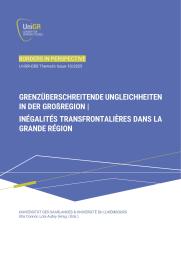Borders in Perspective Vol. 10

European integration has redefined border regions from national peripheries to spaces of opportunity and cooperation. However, social and economic inequalities in their cross-border dimension remain marginal in research on these regions. This thematic issue addresses this gap through the case study of the Greater Region, encompassing Luxembourg, Wallonia, Grand Est, Saarland, and Rhineland-Palatinate. Despite advanced economic integration, the region exhibits stark disparities in income, housing, and public service access. The contributions presented examine how such inequalities shape labour markets, mobility, and social cohesion, while also addressing the shortcomings of current statistical tools to capture transborder dynamics. From the role of wage differentials in driving cross-border work to the housing pressures on surrounding territories, this issue highlights how integration processes can produce both inclusion and exclusion. By focusing on the Greater Region, it contributes to broader debates about inequality beyond national frameworks and underscores the necessity of transnational analytical tools for understanding marginalisation within a unified Europe.
